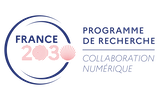The research
SCIENTIFIC CHALLENGES
The Digital collaboration research program (PEPR eNSEMBLE) aims to fundamentally redefine digital tools for collaboration. Whether it’s to reduce the number of journeys we make, improve territorial networking, or tackle the problems and transformations of the coming decades, the challenges of the 21st century will require us to collaborate at unprecedented speed and scale.
More specifically, the Digital collaboration research program aims to address the following scientific challenges:

Develop collaborative environments and innovative conceptual models

Combining human and artificial intelligence in collaborative configurations

Enable seamless collaborative experiences that promote interoperability

Supporting the creation of healthy and sustainable communities

Specifying socio-technical standards with legal/regulatory frameworks
Implementation
Responding to these technological and societal challenges requires a significant investment to develop multidisciplinary work (computer science, ergonomics, cognitive psychology, sociology, design, law, economics) of a theoretical and empirical nature.
The digital collaboration research program (PEPR eNSEMBLE) is developing the conditions for interoperability between communication and sharing services to open up “walled gardens”, which require all participants to use the same services. The aim is to enable new players to offer solutions tailored to specific needs and usage contexts. Users will thus be able to choose combinations of potentially “intelligent” tools and services to define mixed physical and digital collaboration spaces that meet their needs, without compromising their ability to exchange with the rest of the world. By making these services more accessible to a wider population, we can help to reduce the digital divide and meet the challenges of digital sovereignty.
TARGETED PROJECTS
To meet these challenges, the Digital collaboration research program (PEPR eNSEMBLE) is organized around five targeted projects:
ProjeCts
In addition to the targeted projects, four other projects have been selected to taking part of the research program:

COMCOMBBr
Computational modeling of collaboration and mentalization for benevolent bots
Project leader:
Jean-Claude DREHER, CNRS research director at ISC-MJ

Data2Laws
Investigating mechanisms for scaling online collectives
Project leader:
Cécile BOTHOREL, lecturer at ENS Mines-Telecom Atlantique Bretagne Pays de la Loire, Lab-STICC member

DECO
Physical deformation and collaboration
Project leader:
Céline Coutrix, CNRS research director at LIG

PRECOG
Prediction for shared cognition in collaboration with human or artificial agents
Project leader:
Ouriel GRYNSZPAN, lecturer at Université Paris-Saclay, LISN member
PhD program
The PhD program of the Digital Collaboration Research Program (PEPR eNSEMBLE) provides 4 generations of students with the scientific, financial and technological resources to:

Develop their multidisciplinary knowledge and skills to become experts in digital collaboration

Joining a dynamic community to collectively address the scientific challenges of digital collaboration
The interdisciplinary of the research program also enables PhD students to work with scientists from all disciplines, opening up new research opportunities beyond their own research discipline.
More information:
- Apllications for the call for 2025 theses (Français / English)
- List of theses funded by PEPR eNSEMBLE (2023 & 2024 campaigns)
- PhD program archives (2023-2024)

